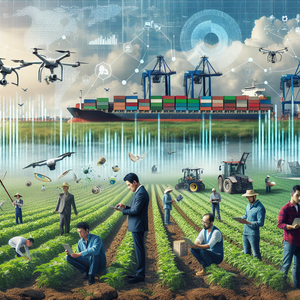
Adapting to Tariffs: 20 Agriculture Careers Pioneering Innovation in a Shifting Trade Landscape
The agriculture industry is navigating a complex and evolving global trade environment. Tariffs, trade wars, and retaliatory policies from nations such as China, Canada, and Mexico have profoundly reshaped the sector. U.S. trade policies in recent years have led to rising costs for essential inputs like equipment and fertilizers, dwindling export opportunities, and mounting financial strain on farmers and agribusinesses. Between 2018 and 2019 alone, U.S. agricultural exports suffered a staggering $27 billion decline, raising questions about the industry’s global competitiveness. Yet amid these challenges, the agriculture sector is proving its resilience through innovation and adaptation. The demand for skilled professionals with expertise in trade policy, supply chain management, agricultural technology, and other crucial fields is at an all-time high. These roles are not only vital in mitigating the impacts of tariffs but also in shaping the future of an industry that feeds the world. In this article, we explore 20 essential agriculture-related careers that are playing a pivotal role in overcoming trade challenges, driving sustainability, and fostering growth. Whether you are a seasoned professional or a newcomer exploring opportunities, these dynamic roles represent the forefront of innovation in agriculture.
Job Summaries:
Agricultural Trade Policy Analyst:
- Agricultural trade policy analysts assess trade agreements.
- Analyze market trends.
- Provide strategic advice to policymakers and agribusiness leaders.
- Play a critical role in protecting global market access for U.S. agriculture.
- Mitigate tariff impacts.
Supply Chain Manager – Agricultural Products:
- Supply chain managers optimize logistical operations and find alternative suppliers to offset tariff-driven costs.
- They ensure the smooth movement of goods, even during trade conflicts, by rerouting shipments and minimizing export losses.
Agricultural Economist:
- Agricultural economists analyze how tariffs affect commodity prices and farm incomes.
- Their insights help design financial assistance programs and guide farmers through volatile markets.
Farm Financial Advisor:
- Farm financial advisors assist farmers with loan options, debt restructuring, and investment strategies.
- They were instrumental in helping farmers secure federal aid during trade wars.
Agribusiness Operations Manager:
- Operations managers streamline processes to adapt to tariff-driven cost pressures.
- Identifying domestic alternatives for imported fertilizers.
- Implementing cost-saving measures.
Export Compliance Specialist:
- Export compliance specialists navigate trade regulations to maintain international market access.
- They prevent shipment delays and ensure compliance with global trade laws.
Agricultural Lobbyist:
- Agricultural lobbyists advocate for farmers by influencing trade policies and securing tariff exemptions.
- They ensure farmers’ interests are represented in legislative discussions.
Rural Development Specialist:
- Rural development specialists revitalize farming communities by improving infrastructure.
- They provide financial aid.
- They encourage sustainable practices like renewable energy adoption.
Agricultural Data Scientist:
- Agricultural data scientists use predictive analytics to forecast market trends and optimize farm operations, helping farmers adapt to tariff-induced challenges.
Commodity Risk Manager:
- Commodity risk managers mitigate price volatility for tariff-targeted commodities.
- They use tools like futures contracts and hedging strategies.
- Their goal is to shield farmers from financial risks.
Farm Equipment Sales Representative:
- Farm equipment sales representatives help farmers access affordable machinery solutions and financing to counter the rising costs of imported equipment.
Trade Relations Manager:
- Trade relations managers expand export opportunities for U.S. agriculture.
- They cultivate international buyer relationships.
- They navigate trade barriers.
Agricultural Policy Advisor:
- Policy advisors collaborate with agencies to craft policies supporting farmers affected by tariffs.
- Designing relief packages for financial losses.
Crop Consultant:
- Crop consultants help farmers optimize yields and reduce costs through precision agriculture techniques, such as GPS-guided equipment to minimize waste.
International Agricultural Marketing Specialist:
- Marketing specialists promote U.S. agricultural exports globally, helping producers diversify their customer base during trade disputes.
Agricultural Technology Specialist:
- Technology specialists introduce automation, robotics, and precision farming tools to offset rising input costs and maintain efficiency.
Food Systems Analyst:
- Food systems analysts assess tariff impacts on supply chains and food accessibility, providing strategies to mitigate disruptions.
Agricultural Journalist:
- Agricultural journalists inform the public and policymakers about tariff impacts.
- They highlight resilience and innovation in the industry.
Farm Bureau Representative:
- Farm bureau representatives advocate for farmers by engaging policymakers.
- Organizing community support initiatives to navigate trade disruptions.
Sustainable Agriculture Specialist:
- Sustainable agriculture specialists promote practices that reduce reliance on imported inputs, such as soil health and renewable energy initiatives.
The agriculture sector is at a turning point, facing unprecedented trade challenges but also unprecedented opportunities for innovation. The 20 careers outlined above are at the forefront of shaping the industry’s response to tariffs, trade wars, and shifting global markets. From policy analysis to technology implementation, these roles are driving resilience, sustainability, and growth. For those looking to make an impact, the agriculture sector offers dynamic career paths with significant potential to address critical challenges and shape the future of global food systems. By pursuing relevant training, certifications, and opportunities, you can be part of the solution to one of the most pressing issues of our time.
Explore More Jobs

